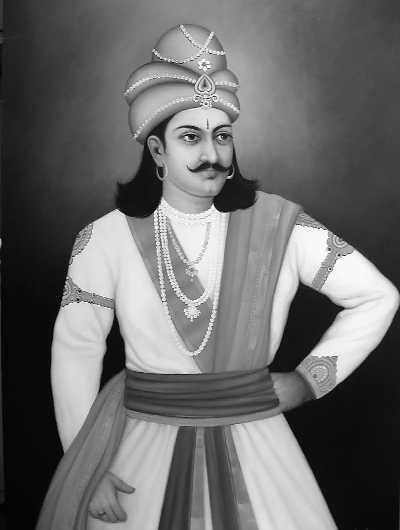
A portrait of Ashoka the Great.
By K. Natwar Singh
HG Wells, the British author, a contemporary of Bernard Shaw and GK Chesterton, wrote in his, Outline of History: “Amid tens of thousands of names of monarchs that crowd the columns of history — their majesties, and graciousness, and serenities and royal highnesses and the like — the name of Ashoka shines and shines almost alone, a star…”
He was Ashoka Devanampiya (beloved of the gods); ‘Piyadasi’ (pleasant to behold). He is the greatest ruler India has produced. He lived from 273 BC to 232 BC.
Ashoka was the grandson of Chandragupta Maurya and the son of Bindusara. Ashoka’s empire extended from present-day Afghanistan to Madurai. The Dharama Chakra, incorporated into the flag of India, is taken from the Ashokan pillar at Sarnath.
For almost two thousand years, Ashoka the Buddhist was all but forgotten. He himself left a detailed account of his reign on many pillars and edicts he built. Two pillars have survived in Delhi.
Romila Thapar in her preface to her book, Ashoka and the Decline of the Mauryas writes: “The reign of Ashoka began to attract attention of historians well over a century ago. In 1837 James Prinsep came out with his work on Ashoka inscriptions in a series of papers. According to KM Panikkar, Ashok’s name was restored to honour as a “result not of Indian researchers but the work of European scholars.”
I conclude this piece with two quotations from his edicts: “All sects deserve reverence for one reason or another. By thus acting a man exalts his own sect and at the same time does service to the sects of other people.” The second is: “All men are my children, and just as I desire my children that they should obtain welfare and happiness both in this world and the next, so do I desire the same for all men.”
I have written this as I am reading Romila Thapar’s wonderful book, Ashoka and the Fall of the Mauryas.
It gave me much pleasure when I read that the Nobel Prize citation and medallion (pure gold) which had been stolen by miscreants was recovered and returned to Kailash Satyarthi. I have so far not met him, but doubtlessly he is a noble and public spirited individual.
It was in the early years of this century that Rabindranath Tagore’s Nobel medal was stolen from a room in which the poet lived. I was then External Affairs Minister. The Swedish government was gracious enough to send a replacement. This was handed over to me by the Swedish ambassador in New Delhi. I decided to take the medal to Santiniketan to give it to the Vice Chancellor. From Kolkata Pranab Mukerjee and I flew by helicopter to Bolpur and then by car to Gurudev’s creation. There we were joined by Governor of West Bengal Gopal Krishna Gandhi, Lok Sabha Speaker Somnath Chatterjee and economist Amartya Sen. The ceremony was short and simple.
I had first been to Santiniketan in December 1954 escorting a Chinese cultural delegation, led by Chen Chen Tho, a great Tagore scholar. I remember his name because I saw much of him when I was posted in China 1956-58.
One more significant memory of Santiniketan has stayed with me. The great Nandlal Bose (a pioneer of modern Indian art) showed me around Kala Bhawan, his creation.
Here’s my list of the famous and the infamous politicians of the 20th century: Mahatma Gandhi (1869-1948), V. Lenin (1870-1924), Winston Churchill (1874-1965), M.A. Jinnah (1876-1948), Joseph Stalin (1879-1953), Franklin D Roosevelt (1883-1945), Adolf Hitler (1889-1945), Jawaharlal Nehru (1889-1964), Charles de Gaulle (1890-1970), Mao Tse Tung (1893-1976) & Nelson Mandela (1918-2013).
Mahatma Gandhi is a class by himself. Lenin was a revolutionary, intellectual, founder of the Soviet Union, was ruthless. Winston Churchill arch-imperialist, racist, greatest Englishman and Nobel laureate. MA Jinnah was a brilliant lawyer, a clear-headed politician who knew what he wanted and got it (Pakistan). Joseph Stalin, founder of the USSR, killed millions of his own people. He led the Soviet Union to victory in 1945 World War-II.
Franklin D Roosevelt was a great US President (four terms) except Lincoln. Adolf Hitler was a charismatic German leader and a brutal killer of millions of Jews. His autobiography Mein Kampf was a bestseller. He committed suicide. Jawaharlal Nehru was a noble humanist, a founder of modern India. Charles de Gaulle is the greatest Frenchman after Napoleon. He was an excellent writer in French and was President of France during 1958-1969.
Mao Tse Tung was a revolutionary intellectual and the founder of the People’s Republic of China. He killed seventy millions of his people. Nelson Mandela is one of the great moral and political leaders of our time. He spent 27 years (1964-1991) in prison. A Nobel laureate, he was President of South Africa during 1994-1999. He died at the age of 95.



























